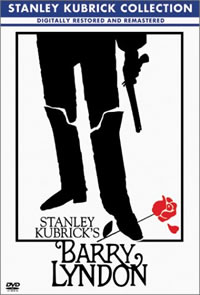A Rakes Progress

A Movie Review
A huge critical success upon its original release (even nominated for best picture 1975), Barry Lyndon was a box-office bomb (and a rather expensive one, judging by the apparent production values). Produced in director Stanley Kubricks slow & hypnotic post-Dr. Stranglove style, the movie is based on the same-titled novel by William Makepeace Thackeray. Starting off in 1750's Ireland, Redmmond Barry (played by Ryan O'Neal) is the nephew of a promenit landholder, who falls in love with his cousin, the fair Nora Brady (Gay Hamilton). When Nora becomes engaged to English officer Capt. John Quinn (the union to which will bring much needed money to Barry's cash-strapped uncle), the impertinent young lad challenges his rival to a duel. Upon believing he has killed the British captain Barry flee's to exile in Dublin, however he is mugged by highwaymen on the way and is forced to join the British Army to survive.
After some time in training with the army, a family friend who happens to be an officer arrives to take command of Barrys regiment. The officer Capt. Feeny (Arthur O'Sullivan) informs young Barry that his pistol was full of blanks and the whole duel had been part of an elaborate scheme to get him out of the way so that Nora could marry Capt. Quinn. Capt. Feeny takes Redmmond Barry under his wing, only to be killed in their fast battle as part of the Seven-Years War. Now fearful of his own death, Redmmond steals an officers uniform and papers in the hopes of making his way to Holland, and from there home to Ireland. On his way to the Netherlands Barry has a brief affair with farm women, is found to be an imposter by a German officer, and is mustered into forced service in the Prussian Army. All this in just the first hour of a three-hour movie.
The film for the first half is essentially a chronicle of the many adventures of a young opportunist, who in addition to the activities I have already described, gets to be a spy, a professional gambler, and even an English nobleman. Barry Redmmond gets his nobel title and the surname Lyndon, by marrying the Lady Lyndon (Marisa Berenson) after the death of her first husband the sickly Sir Charles Reginald Lyndon (played in a brief, somewhat over-the-top performance by a personal favorite of mine, British character actor Frank Middlemass).
The second half of the picture is best described as somber, while the first half was rather mischievous in tone. As with any morality tale Barry Lyndon gets his come-upence. Now rich and somewhat powerful, Barry plunges full-force into efforts to secure a Lordship for himself (so as to assure his statues, wealth, and prestige in the event of his wife's death), squandering much of the family fortune in the process and alienating his step-son in the process. Many horrible things happen to Barry as a result of his selfish and arrogant ways, (including the death of his only son) and he ends up poor, titlelless, and absent one leg (I won't tell you how, got to give you some reason to see the film).
Barry Lyndon is not for everyone, as its meager box-office gross will prove, but it is brilliant done film with fabulous visuals (Director Kubrick wanted to film this picture with natural light whenever possible, so he had a new kind of camera filter developed, that could garner sufficient illumination from candelight). However if you think that you could sit through an 18th Century epic that runs like 2001: A Space Odyssey, then Barry Lyndon might be a film for you.

0 Comments:
Post a Comment
<< Home